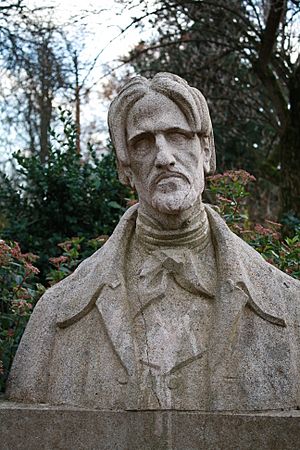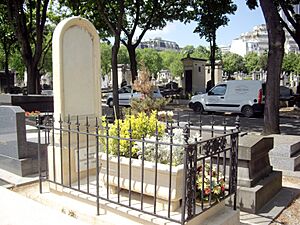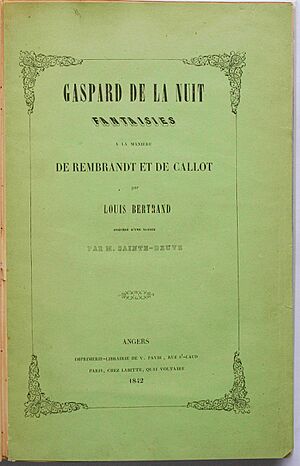Aloysius Bertrand facts for kids
Aloysius Bertrand (born Louis Jacques Napoléon Bertrand) was a French poet, writer, and journalist. He lived from April 20, 1807, to April 29, 1841.
He is famous for creating a new style of writing called prose poetry in French literature. Many people see him as an early inspiration for the Symbolist art movement. His most famous work is a collection of prose poems called Gaspard de la Nuit. It was published after he died, in 1842. Later, in 1908, the famous composer Maurice Ravel turned three of its poems into a piano music piece with the same name.
Contents
Aloysius Bertrand's Life Story
Early Life and Family
Louis Jacques Napoléon Bertrand was born in Ceva, a town that was part of France at the time, on April 20, 1807. His father, Georges Bertrand, was a soldier. His mother was Laure Davico.
When Louis was five, his father became a captain in the gendarmerie (a type of police force). His family moved to Spoleto and then to Mont-de-Marsan. In 1815, his father retired, and the family settled in Dijon, a city in France.
Growing Up in Dijon
Louis Bertrand studied at the royal college in Dijon from 1818 to 1826. He spent most of his younger years in this city. He became very interested in the history and culture of Dijon.
After his father passed away in 1828, Louis had to help support his family. He received some financial help from his aunt. He started writing for a local literary newspaper called "Le Provincial." Here, he shared his new ideas about writing and published many of his early poems and prose works.
First Visit to Paris
In late 1828, Louis Bertrand moved to Paris. He was encouraged by famous writers like Victor Hugo and Charles Augustin Sainte-Beuve, who liked his poems. He met Sainte-Beuve and read some of his prose to him.
However, he found it hard to fit in with the famous writers in Paris. He also faced health issues and financial problems. He tried to get his poems published, but the publisher went out of business. He also tried writing for the theater, but his play was not accepted.
Back to Dijon and Journalism
Feeling discouraged, Louis decided to return to Dijon in April 1830. He started working for a new newspaper called "Spectateur." In 1831, he became the chief editor of another newspaper, "Patriote de la Côte-d’Or." He used this newspaper to share his strong republican views.
Final Years in Paris
In January 1833, Bertrand moved back to Paris. A publisher agreed to publish his book, Gaspard de la Nuit, and even announced it would be released soon. He also worked as a secretary for a baron.
He continued to face money problems and had to borrow from many people. Sadly, he became very ill with tuberculosis, a serious lung disease. He spent time in different hospitals between 1838 and 1839.
In 1839, another publisher agreed to print Gaspard de la Nuit, but it never happened while Bertrand was alive. He kept trying to get his book published, but the publisher stopped their work.
Aloysius Bertrand passed away in a hospital in Paris on April 29, 1841. His family did not visit him in the hospital or attend his funeral.
His Lasting Impact
Gaspard de la Nuit was finally published in November 1842, a year after Bertrand's death. The first edition had many mistakes because it was copied incorrectly. It wasn't until 1992 that a special handwritten copy of his book was found. This allowed the book to be published exactly as Bertrand had wanted it, with all the correct text and drawings.
Many famous writers were inspired by Bertrand's work. Charles Baudelaire said Bertrand deeply influenced his own prose poems. Théodore de Banville also named Bertrand as a major inspiration. He became a very important author for the Symbolist movement, especially for Stéphane Mallarmé.
In the 20th century, Bertrand's work finally received wide recognition. Writers like Max Jacob and the Surrealists helped make him famous. André Breton, a leader of the Surrealist movement, mentioned him in his famous "Surrealist Manifesto." Even the artist René Magritte named one of his paintings "Gaspard de la nuit."
Today, there is a street named Aloysius Bertrand in Dijon, honoring his memory.
See also
 In Spanish: Aloysius Bertrand para niños
In Spanish: Aloysius Bertrand para niños
 | Selma Burke |
 | Pauline Powell Burns |
 | Frederick J. Brown |
 | Robert Blackburn |




